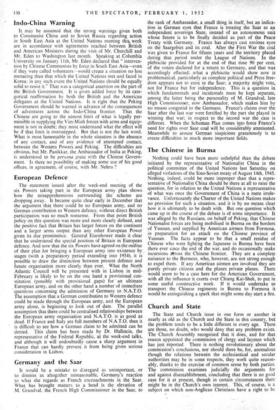European Defence
The statement issued after the week-end meeting of the six Powers taking part in the European army plan shows how the misapprehensions surrounding the scheme are dropping away. It became quite clear early in December that the argument that there could be no European army, and no German contribution to Western defence, without direct British participation was so much nonsense. From that point British policy on this question was more and more clearly defined, and the positive fact that Britain has larger forces on the continent and a larger arms output than any other European Power given its due prominerice. General Eisenhower made it clear that he understood the special position of Britain in European defence. And now that the six Powers have agreed on the outline of their plan for bringing a European army into existence by stages (with a preparatory period extending into 1954), it is possible to draw the distinction between present defence and future organisation more clearly than ever. What the North Atlantic Council will be presented with in Lisbon in mid- February is likely to be on the one hand a provisional con- stitution (possibly with provisional gaps) for ' an ultimate European army, and on the other hand a number of immediate questions concerning the admission of Germany to N.A.T.O. The assumption that a German contribution to Western defence could be made through the European army, and the European army alone, is beginning to look out of date. The parallel assumption that there could be centralised relationships between the European army organisation and N.A.T.O. is as good as dead. If France and Italy are full members of N.A.T.O. then it is difficult to see how a German claim to be admitted can be denied. This claim has been made by Dr. Hallstein, the representative of the Federal Republic, at the week-end talks, and although it will undoubtedly cause a sharp argument in France that can hardly prevent it from being given serious consideration in Lisbon.


































 Previous page
Previous page